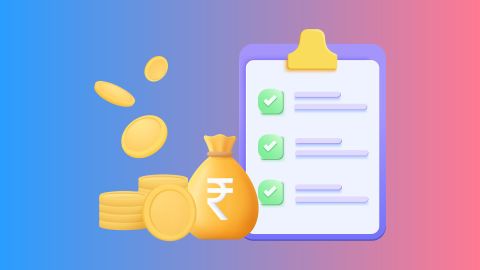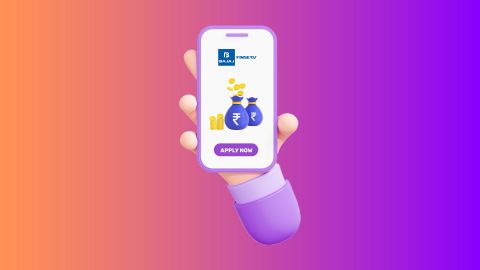You might have various questions such as what are secured loans, what are unsecured loans, and how to choose between the two types of loans. Understanding the difference between secured and unsecured loans is crucial. By exploring these differences, including aspects related to personal loans, you'll be equipped to make a more informed and financially sound decision. Read on to get detailed answers and choose the loan type that best meets your needs.
What is a secured loan?
Secured loans require collateral, which is an asset of monetary value that the lender holds as security until the loan is fully repaid. This collateral could be items such as a house, gold, property, or other tangible assets. If you fail to repay the loan, the lender has the right to sell the collateral to recover the loan amount. Secured loans typically offer lower interest rates and processing fees compared to unsecured loans, making them an attractive option if you have valuable assets to pledge.
Features of a Secured Loan
A secured personal loan requires collateral such as property, gold, or fixed deposits, making it less risky for lenders. These loans typically come with lower interest rates and higher borrowing limits due to the security involved. Borrowers can use them for various financial needs, including home renovation, education, or business expansion.
- Requires collateral: Secured loans need an asset as security, reducing the lender’s risk.
- Lower interest rates: Since lenders have collateral as security, the interest rates are usually lower.
- Higher loan amounts: Borrowers can avail of a higher loan amount depending on the collateral value.
- Longer repayment tenure: These loans offer flexible repayment terms, making them more manageable.
- Risk of asset loss: If repayments are not made on time, the lender can seize the collateral.
Examples of a Secured Loan
A secured personal loan can be availed against various assets to meet financial requirements. Borrowers often opt for these loans to fund education, home improvements, or large purchases.
- Home loan: A loan taken against a property where the house itself serves as collateral.
- Car loan: A vehicle loan secured against the car being purchased.
- Gold loan: Borrowers pledge gold jewellery to obtain funds quickly.
- Loan against property: Homeowners can use their property to secure a loan for various purposes.
What is an unsecured loan?
Unsecured loans do not require collateral, as they are granted based on your credit score, income, and financial history. Common examples include personal loans and student loans. To qualify for an unsecured loan, you typically need a strong credit score, a history of timely tax filings, a stable job, and responsible credit behavior. Since these loans do not have collateral backing them, lenders face a higher risk, which often results in higher interest rates and processing fees. Despite the higher costs, unsecured loans provide flexibility and access to funds without needing to pledge valuable assets.
Features of an Unsecured Loan
An unsecured personal loan is granted without requiring collateral, making it accessible to a wider audience. Lenders assess creditworthiness based on income, credit score, and repayment history. Since unsecured loans involve higher risks for lenders, they often come with slightly higher interest rates and stricter eligibility criteria.
Key Features of Unsecured Loans
- No collateral required – Borrowers do not need to pledge assets, making the process hassle-free.
- Quick disbursal – Minimal documentation ensures faster loan approval and fund transfer.
- Flexible tenure – Repayment terms range from a few months to several years.
Examples of an Unsecured Loan
An unsecured personal loan can be used for multiple purposes, from medical emergencies to home renovations. Since unsecured loans do not require security, they are a preferred choice for salaried professionals and self-employed individuals.
Common Types of Unsecured Loans
- Personal Loan – A multi-purpose loan with no restrictions on usage.
- Education Loan – Helps students finance higher education without collateral.
- Business Loan – Entrepreneurs access funds without pledging assets.
- Microfinance Loan – Small-ticket loans for low-income individuals and businesses.
For more details on unsecured loans, check out the types of unsecured loans.
Secured loan vs. Unsecured loan: Which one is best for you?
Deciding between a secured and unsecured loan depends on your financial situation and goals. This guide will help you understand the key differences and choose the best option for your needs.
Criteria |
Secured Loan |
Unsecured Loan |
Collateral required |
Yes, assets like property or gold |
No, based on creditworthiness |
Interest rates |
Typically lower due to reduced lender risk |
Generally higher due to increased risk |
Processing fees |
Often lower |
Typically higher |
Approval time |
May take longer due to collateral valuation |
Often quicker, as no collateral assessment required |
Risk of asset loss |
High, if unable to repay the loan |
None, no collateral at stake |
Credit score impact |
Can be more lenient with lower credit scores |
Requires a good credit score for approval |
Repayment terms |
Flexible, often with better terms |
May have less favorable terms due to higher risk |
Unsecured loans might be the best option for you if you prefer not to risk any assets. They offer flexibility in borrowing without collateral requirements and can be processed more quickly. With a strong credit score and stable income, you can secure favourable terms despite higher interest rates.
4 Other Factors that can help you choose between unsecured and secured loans
To make a well-informed decision about choosing between secured and unsecured loans, including a personal loan, here's how you can determine which type best suits your financial needs.
1. Your comfort with collateral
Collateral is the main component that allows you to apply for a secured loan. For example, you may pledge your house to borrow funds to start a company. Or you may pledge your investments (such as FDs or other securities) to avail of money. Lenders may have a minimum value for your collateral below which they do not accept security at times. Additionally, the value of your security will be higher than the loan amount offered to you. Keeping these things in mind, decide whether pledging security works for you. If you are not exposing yourself to risk by pledging a valuable asset, you can opt for this loan.
2. Your monetary requirement
Secured loans offer higher loan amounts on a flexible tenure of up to 25 years in the case of home loan, for example. Instead, an unsecured loan is sanctioned to you based on your income, credit score, and other lender-specific eligibility terms. Thus, the loan amount and tenure are limited and shorter in comparison to a secured loan. So, while applying for a loan, keep your needs in mind and select the type that best suits your goals. For example, buying electronics and furniture for your new home with an unsecured loan is a good idea as you can quickly repay your loan using funds from your income.
3. Your timeline for meeting your requirements
An unsecured loan is a collateral-free loan. So, you apply for it in simple and easy terms and access it without delay. This makes these loans more adept for immediate needs such as a wedding in the family, hospitalisation costs, and home repairs. If you want to invest in business expansion or buy a new premise for your operations, you will need substantial funds for a longer tenure. In this case, a secured loan like a loan against property comes to your aid. An unsecured loan is a collateral-free loan. So, you apply for it in simple and easy terms and access it without delay. This makes these loans more adept for immediate needs such as a wedding in the family, hospitalisation costs, and home repairs. However, if you want to invest in business expansion or buy a new premise for your operations, you will need substantial funds for a longer tenure. In this case, a secured loan like a loan against property comes to your aid.
4. Your credit score
When you borrow a collateral-free loan, your credit score is significant as it is the primary way a lender can judge your creditworthiness. Here, a good credit score above 650 will get you a high-value loan sanction at a more competitive interest rate. In contrast, alongside your credit score, your asset is the key to getting you a hefty sanction on flexible loan terms when you borrow a secured loan. So, if your credit score is under par, it may be more affordable for you to opt for a secured loan. If your needs are not urgent, you can also improve your credit score, and then borrow an unsecured loan.
Understanding these types of loans will help you choose the right option for your needs, giving you the easiest and quickest way to tackle planned and unforeseen expenses.
Pros and cons of Secured and Unsecured Loans
When comparing a secured vs unsecured personal loan, it is essential to evaluate their advantages and drawbacks. A secured loan requires collateral, offering lower interest rates and higher loan amounts but posing the risk of asset loss. In contrast, an unsecured loan does not require collateral, making it more accessible but often carrying higher interest rates and stricter eligibility criteria. Understanding secured and unsecured loans helps borrowers choose based on financial needs, repayment capacity, and risk tolerance.
Pros and cons of secured and unsecured loans
Pros of Secured Loans
- Lower interest rates: Collateral reduces lender risk, leading to lower interest rates.
- Higher loan amounts: Loan eligibility is based on asset value, allowing larger borrowing limits.
- Flexible repayment terms: Lenders offer extended tenures, making EMIs manageable.
Cons of Secured Loans
- Risk of asset loss: Defaulting on payments can lead to collateral repossession.
- Longer processing time: Lenders need time to assess the pledged asset.
Pros of Unsecured Loans
- No collateral required: Borrowers do not need to pledge assets for approval.
- Faster approval and disbursement: Minimal documentation speeds up the loan process.
Cons of Unsecured Loans
- Higher interest rates: Lenders charge higher rates to compensate for the risk.
- Stricter eligibility criteria: A good credit score and stable income are essential for approval.
*Terms and conditions apply.
DISCLAIMER:
While care is taken to update the information, products, and services included in or available on our website and related platforms/websites, there may be inadvertent inaccuracies or typographical errors or delays in updating the information. The material contained in this site, and on associated web pages, is for reference and general information purpose and the details mentioned in the respective product/service document shall prevail in case of any inconsistency. Subscribers and users should seek professional advice before acting on the basis of the information contained herein. Please take an informed decision with respect to any product or service after going through the relevant product/service document and applicable terms and conditions. In case any inconsistencies observed, please click on reach us.
*Terms and conditions apply








